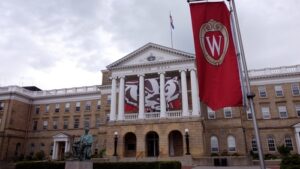
Ahead of the 2024 presidential election in November, U.S. Rep. Bryan Steil (R-WI) wants assurances from the Universities of Wisconsin that federal funds won’t be used for partisan purposes.
“In recent years, there have been allegations that some universities around the country have misused taxpayer funds to support partisan election efforts,” Rep. Steil wrote in a June 3 letter sent to Universities of Wisconsin President Jay Rothman. “Please join me in reaffirming that this will not happen at the Universities of Wisconsin.”
The congressman, who serves as chairman of the U.S. House Administration Committee, which has broad oversight of federal elections, is an alumnus of the University of Wisconsin and a former member of the Board of Regents, and he wants to ensure that the Universities avoid any appearance of partisanship.
“I am sure you would agree that it should not be the prerogative of a public institution that receives funding from American taxpayers to lead partisan “get out the vote” (GOTV) activities or to enlist the participation of self-identified advocacy groups for voter registration drives,” wrote Rep. Steil.
Congress has prohibited the use of funds from the Help America Vote Act of 2002 from being used to support partisan voter registration drives, Rep. Steil reminded Rothman.
And while President Joe Biden on Feb. 26 announced that U.S. Department of Education Federal Work Study funds could be used to support voter registration drives and GOTV efforts ahead of the 2024 election, Rep. Steil wrote that doing so would draw “considerable negative attention.”
“As we head into another election season,” wrote the lawmaker, “I ask for your assistance in guiding the Universities in a direction that avoids these pitfalls this year.”
Making it easy to vote, he added, should not be done in partnership with partisan groups or in a biased manner that “undermines the taxpayer’s confidence in a public entity like the Universities of Wisconsin.”



